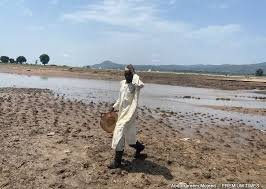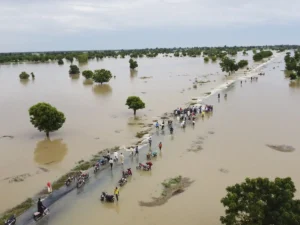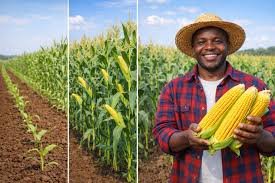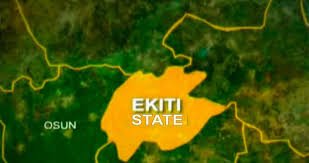
KANO, Nigeria – In the vast farmlands of Northern Nigeria, where agriculture feeds more than half the nation, despair is quietly germinating. Soaring input costs, relentless floods, and unyielding insecurity have pushed farmers to their breaking point. The Northeast Governors’ Forum has raised the alarm: if urgent action is not taken, Nigeria’s agricultural backbone could collapse ahead of the 2025 planting season.
For smallholder farmers like Pindama Audu and Charles Chudama in Adamawa, the crisis is not theoretical—it is the difference between hope and hunger, survival and suicide. As the Food and Agriculture Organization (FAO) warns that 26.5 million Nigerians will be food insecure in 2025, the struggle for seeds and fertiliser has become a struggle for life itself.
This report, Hussaini Ibrahim Kafi, exposes the harsh realities of rising costs, weak policies, and fragile livelihoods—and asks whether Nigeria can sow resilience before it is too late.

Why It Matters: The Heart of Nigeria’s Food Security
Northern Nigeria is the nation’s food basket. If its crops fail, the shockwaves reverberate across the entire country—empty markets, malnourished children, and inflation that fuels instability. Already, double-digit food inflation is eroding incomes. The FAO warns of worsening malnutrition, with Médecins Sans Frontières (MSF) recording over 652 child deaths from malnutrition in Katsina State alone within six months of 2025—a staggering 208 per cent rise from the previous year.
Without urgent interventions, this agricultural crisis could spiral into a humanitarian disaster.

Farmers in Crisis: Seeds and Fertiliser Beyond Reach
At Lakare B in Yola South, Audu clutches the little he has managed to save old seeds from last season. “Fertiliser is now ₦60,000 to ₦70,000 per bag. Small farmers cannot afford that,” he says bitterly.
Across the road in Lakare A, Chudama improvises animal manure replaces fertiliser, recycled seed substitutes certified inputs, and crop choices shift. “Beans and guinea corn are risky cattle destroy them before harvest. We plant maize and legumes that mature faster,” he explains.
Their testimonies mirror a nationwide problem: input costs spiralling out of reach. Though official inflation data shows food inflation dipped from 39.53 per cent in 2024 to 22.74 per cent in July 2025, families still face rising prices month-on-month. Borno recorded 55 per cent food inflation—one of the highest in the country.

Climate Chaos: Floods, Rains, and Washed-Out Farms
Climate shocks compound the crisis. Chudama recalls losing crops worth ₦2.7 million when a flood swallowed his fields in August. “Everything disappeared overnight,” he says.
Flooding, erratic rainfall, and soil degradation are stripping away resilience from rain-fed agriculture. While some areas report steadier rainfall this year, the unpredictability leaves farmers gambling with each planting season.
The FAO estimates 30.6 million Nigerians will face acute food insecurity during the June–August 2025 lean season. Though slightly fewer than in 2024, the figure still makes Nigeria one of the hungriest countries on earth.

Insecurity: Harvests Stolen, Hopes Crushed
Even when the rains are kind, insecurity is cruel. Farmers complain of cattle grazing unchecked, often with impunity. Reporting to security agents, they allege, yields little. “Sometimes security agents accept bribes and do nothing,” Audu laments.
The result: farmers plant shorter-cycle crops to avoid losses, even if they are less profitable and nutritionally weaker. Sorghum and guinea corn give way to maize and groundnuts. Food diversity declines: hunger grows.
Studies confirm that insecurity directly reduces crop and livestock output, undermining both food availability and farmer morale.
Policy Failure: The Anchor Borrowers’ Programme and Beyond
Launched in 2015, the Anchor Borrowers’ Programme (ABP) promised credit and guaranteed markets. A decade later, it is a story of missed opportunities.
Chudama recalls: “We heard about it, but it never reached us.” For many smallholders, the programme was a rumour rather than a lifeline.
Nationwide, defaults crippled the scheme. Out of ₦283 billion loaned to rice farmers, more than half—₦145.77 billion—remains unpaid. Ginger farmers pursuing ₦374 billion in claims had their case dismissed on technical grounds.
Without accountability and transparency, flagship programmes become hollow slogans.

Untapped Potential: Irrigation and Resilient Systems
Nigeria possesses 3.4 million hectares of land suitable for irrigation, yet less than 220,000 hectares are in use. Reliance on erratic rainfall leaves smallholders perpetually vulnerable.
Economist Anas Danbare argues: “This is not just about fertiliser. It is a breakdown in supply chains, infrastructure, and security. Unless we build resilient systems—crop insurance, transparent subsidies, irrigation, and community security—food resilience will remain a dream.”
Danbare calls for solar-powered irrigation, transparent subsidy management, and community-based security models. “We must build systems, not handouts,” he insists.
Human Cost: Silent Fields, Empty Kitchens
The silence from government officials in Adamawa, despite repeated requests for comment, reflects a troubling gap between rhetoric and reality. Farmers’ cries echo unheard in capital offices, even as aid agencies cut nutrition services due to dwindling funds.
For families, the crisis is visceral. In Katsina, hundreds of children succumbed to malnutrition within months. In Adamawa, farmers debate whether to risk another planting season or abandon farming altogether.
Audu clings to his saved seeds. Chudama tallies his debts. Their stories are not isolated—they are snapshots of a nation teetering between survival and collapse.
Planting Hope Before It Is Too Late
The seeds of uncertainty sown in Northern Nigeria’s fields threaten to germinate into hunger, unrest, and despair. Unless interventions become transparent, inclusive, and resilient, the consequences will be catastrophic—not just for farmers but for every Nigerian.
The story of Northern Nigeria’s farmers is more than an agricultural crisis—it is a mental health warning. Despair in the fields often translates into despair in homes. When families cannot eat, hope dies, and hopelessness breeds tragedy.
Nigeria stands at a crossroads. It can allow insecurity, policy failures, and climate shocks to choke its food future. Or it can plant seeds of resilience—irrigation, security, accountability, and farmer support—that guarantee both survival and dignity.
The choice is urgent. The time is now.






